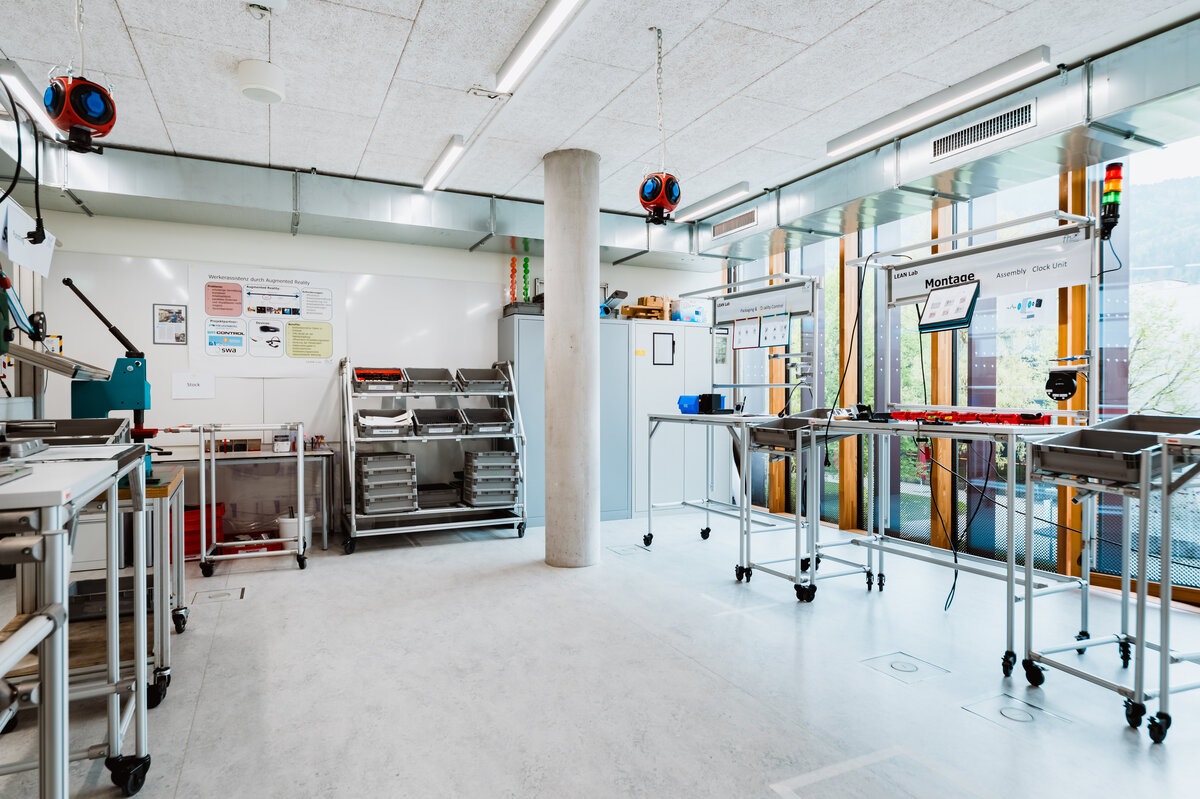Learning factory of tomorrow: The Lean Lab brings theory to life
- 25.07.2025
- Research

The Lean Lab at FH Kufstein Tirol: fully equipped learning factory for practical teaching and training.
The University of Applied Sciences Kufstein Tirol is breaking new ground in practical teaching with its innovative learning factory: In the Lean Lab, students from various fields of study and corporate partners experience lean management up close – on a realistic production line.
In conversation with Prof. (FH) Dr. Martin Adam, Head of the Lean Lab and Director of Studies for the Master's program in ERP Systems & Business Process Management, it becomes clear that the Lean Lab is more than just a traditional teaching format—it is a place where theory, technology, and teamwork come together in a unique way.
WHERE LEARNING BECOMES AN EXPERIENCE
“We rely on learning by doing,” explains Adam. “After a brief theoretical introduction, participants—students and company executives alike—get to work directly at realistic workstations.” The environment is designed to simulate and improve production processes, making it ideal for training, project work, and practical teaching.
The focus is not on complex technology, but on the lean principle of achieving improvements cost-effectively and efficiently with existing board resources.
WE CONSCIOUSLY FOCUS ON SIMPLE, PRACTICAL SOLUTIONS – AND ONLY USE DIGITAL TOOLS SUCH AS AR, VR, RFID, OR DASHBOARDS WHERE THEY BRING REAL ADDED VALUE.
Prof. (FH) Dr. Martin Adam
Head of the Lean Lab and Director of Studies for the Master's program in ERP Systems & Business Process Management
This way, classic lean principles blend with selected digital approaches to create a practical overall picture of modern production processes.
In industrial engineering or ERP systems and business process management, several degree programs make intensive use of the Lean Lab. Courses such as Smart Factory Planning, Digitization on the Shop Floor, Kanban Training, and Lean Leadership draw directly on the learning environment. Exchange students are also involved.
CONNECTING STRATEGY, PROCESSES, AND IT
Particular attention is paid to linking strategy, processes, and IT. Participants learn, for example, how overarching corporate goals—such as quality or efficiency—are broken down into concrete operational goals. This creates a deep understanding of goal cascading, material flow, and digital support on the shop floor.
“Digitalization is not an end in itself for us,” Adam emphasizes. “We see it as a tool that should be used precisely where it brings the greatest benefit to people.”
PRACTICAL AND BUSINESS-ORIENTED
The Lean Lab was established over ten years ago as a result of close cooperation with industrial partners, including Stihl, Liebherr, and Freudenberg. Today, it is not only used for teaching purposes, but also as a training environment for companies that want to optimize their processes according to lean principles. In two-day workshops, managers gain insights into methods for increasing efficiency and apply them directly in the learning factory. The program is supplemented by company visits and individual coaching sessions.
Particularly successful was a month-long training course at Liebherr in Telfs and a week-long training series with around 300 employees from an industrial partner at the University of Applied Sciences Kufstein Tirol.
FOCUS ON LEADERSHIP
In addition to process optimization, the Lean Lab is increasingly focusing on the topic of lean leadership. “How do I communicate? How do I set goals? How do I give feedback?” Adam describes the central questions of the new workshop series. In times of skilled labor shortages and pressure to transform, treating people with respect and as equals is becoming increasingly important—even on the shop floor.
RESEARCH & PERSPECTIVES
Although there are currently no active research projects, the Lean Lab has been part of several funded initiatives on topics such as Industry 4.0, digitalization, ERP systems, and supply chain management. Looking ahead, AI applications in quality control and new forms of human-machine interaction will also play a role—for example, through image comparisons for error detection in production.
INVITATION TO THE LEAN LAB
Whether students, company representatives, or training participants, the Lean Lab is open to anyone who wants to question, optimize, and future-proof their processes.
“We want to create a space where people not only learn, but also enjoy learning,” Adam summarizes. “Because enthusiasm is the best driver for sustainable change.”
Links:
- Lean Lab | Science Labs
- ERP Systems & Business Process Management | pt
- Industrial Engineering & Management | ft
